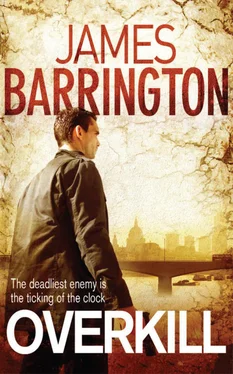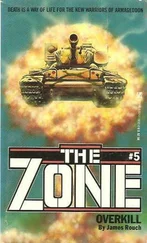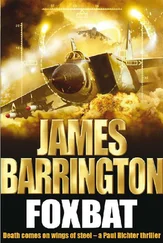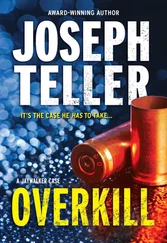There was little stamp of personality. There were a few pictures on the walls, quite possibly supplied with the apartment; the carpets were uniform shades, matching the sitting-room furniture, and the few books were a catholic mixture of reference works and a selection of paperbacks, mainly westerns and thrillers.
Richter took the notebook from his pocket and found the right page, then glanced round the sitting room hopefully. There was a small writing desk in one corner, fitted with a drop-down flap, which was up, and locked. On the desk was another picture of a lady of middle years, similar to the one Richter had already removed from Newman’s office, so he took that. He looked closely at the lock on the writing desk, but there was no evidence of forced entry. That didn’t mean it hadn’t already been searched. It isn’t necessary to leave convenient telltale scratches on a lock when probing with a pick or skeleton key. In fact, if the metal of the lock is of reasonable quality, it’s difficult to mark it at all.
Erroll produced the key, unlocked the desk and dropped the flap. There were six vertical slots inside, three each side of a central section of two drawers. The top drawer produced assorted cuff-links, paper-clips, drawing pins and an elderly bow tie – the elasticized sort, which caused Erroll to sneer slightly – while the second contained about fifty pounds sterling value in roubles. The slots held an insurance policy, which Richter added to his pile, and a group of letters with a Northumberland postmark. He glanced through two or three, and then put them with the photograph.
Fifteen minutes later, having briefly checked every drawer in the flat and the interior of the wardrobe, Richter had finished. He wrote out a detailed list of all the items he had removed, duplicated it, and then he and Erroll signed each copy. Erroll kept one, and the second went into Richter’s briefcase. ‘That’s it. Thank you very much for your co-operation.’
‘Not at all, old boy.’
Richter glanced at his watch. ‘How long to the airport?’
‘It’s about twenty miles, so say thirty-five minutes, at this time of day.’
Aspen Three Four
There are slow descents, there are cruise descents and there are fast descents. What Frank Roberts was doing could perhaps have been best described as a plunge descent, with the aircraft losing in excess of twenty thousand feet a minute. The one thing he could not do was to overshoot the field, because they certainly wouldn’t have the fuel to get back to it, and he knew the USAF would be really pissed if he dumped the Blackbird down on some Scottish hillside instead of a concrete runway.
At twenty-five thousand feet the sky was clear, but the cloud that the Distress and Diversion Cell Controller had reported over Lossiemouth actually blanketed most of the United Kingdom. It looked like dirty grey soup, and the Blackbird plunged into it twenty-seven miles east of the airfield. The world outside the cockpit immediately went black with zero visibility, but Frank Roberts was already flying solely on instruments.
He was twenty-two miles out when he raised Lossiemouth. ‘Lossiemouth Director, this is Pan aircraft Aspen Three Four squawking Emergency. We’re IMC in thick cloud, passing Flight Level one two zero in a fast descent on a heading of two eight five, and requesting a straight-in approach to a priority landing.’
RAF Lossiemouth, Grampian, Scotland
In the Approach Room at Lossiemouth the Director, a young flight lieutenant, had been watching the rapid movement of the 7700 Emergency squawk across his screen. The Emergency Services were standing by, fire engines and ambulances waiting on the airfield, engines running, fully manned.
‘Aspen Three Four, Lossiemouth Director, all copied. You are identified with nineteen miles to run to the field. Maintain your present heading and continue descent to two thousand feet on QNH two nine decimal eight one inches. Confirm you are now subsonic.’
‘Three Four is subsonic and in the drop to two thousand on twenty-nine eighty-one.’
Passing ten thousand feet, the Blackbird crew unsealed their visors and raised the faceplates. As usual, the cockpit smelt of burnt metal. At fifteen miles range, the squall that had been gathering to the west of the field finally hit, reducing visibility to under a mile.
‘Aspen Three Four, Director. We’ve been hit by a squall and visibility is under one mile with full cover cloud at three hundred feet. This will be a precision approach to runway two three. Turn left heading two five zero.’
The Director broke off as the Radar Supervisor touched his shoulder and spoke to him. Rather than risk losing contact with the aircraft on a frequency change, the Supervisor had decided that the talk-down would be carried out on the Director’s frequency.
‘Aspen Three Four, you have twelve miles to run to the field. Confirm you are now level at two thousand feet.’
‘Confirmed. Level at two.’
‘Roger. Squawk standby, carry out final landing checks and listen out on this frequency for your Final Controller.’
Twelve miles out, the profile of the Blackbird altered as the landing gear was extended, and the aircraft adopted a pronounced nose-high attitude.
‘Aspen Three Four, this is Lossiemouth Final Controller. I hold you on precision radar at range ten. Turn left heading two four five.’
‘Two four five, Three Four.’
Unlike the clipped and precise instructions given by all other controllers, a precision approach has almost a conversational style about it. This is at least partly due to the fact that the controller talks constantly to the pilot from just before the aircraft starts its final descent until it reaches the runway. ‘You’re slightly left of the centreline, closing gently on a heading of two four five. Approximately one mile to run to the descent point.’
The talk-down controller paused for a few seconds, then pressed the transmit key forward into the locked position, and began talking. ‘Aspen Three Four, seven miles from touchdown, and approaching the descent point. Heading two four five. Slightly left of centreline, closing gently. You need not acknowledge further transmissions unless requested.’
On the twin precision radar displays the Blackbird’s return was small and painting faintly, but it was visible. Still below the electronic glide path, the right-hand edge of the return was nearly touching the centreline. The controller watched the return on the elevation screen touch the glide path. The trick was to start the aircraft in descent a little before the centre of the return intersected the glide path. This allowed for delays in the pilot’s reactions and the physical time taken by the aircraft to transition from level flight into a descent.
‘Six and three-quarter miles from touchdown. Begin your descent now for a three-degree glide path.’ The standard three-degree glide path meant that the aircraft descended at the rate of three hundred feet for every track mile flown. ‘Six miles from touchdown. Turn left five degrees heading two four zero. You’re now on the centreline, but still very slightly above the glide path.’
By five miles out, the Blackbird had settled down on the glide path, and the controller had no need to give descent corrections. As the aircraft got closer to the ground, however, the gusty wind made frequent heading changes necessary. ‘Three miles from touchdown, heading two three five, very slightly right of centreline but on the glide path. Confirm final landing checks complete – Aspen Three Four acknowledge.’
‘Three Four has checks complete.’
‘Roger. Heading two three five, on the glide path. You have been cleared to land on runway two three.’
Читать дальше












